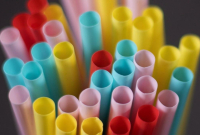Support strong Canadian climate journalism for 2025
Poland Spring announced Monday a plan to use 100% recycled plastic for all its noncarbonated water containers, a move that comes amid growing concern about plastic pollution.
The Maine-based company said the effort kicks off this month with 1-litre bottles. By 2022, the company plans to use 100% recycled plastic for bottles in all of its still water lines. A niche product called Poland Spring Origin also uses 100% recycled plastic bottles.
The migration to recycled containers comes as the bottled water industry faces continued criticism over its use of plastic, much of which ends up as trash or litter. In Maine, Poland Spring has also faced scrutiny over the volume of water pumped from the ground as the brand has surged in popularity.
Kirstie Pecci, from the Boston-based Conservation Law Foundation, said Poland Spring's recycling efforts are better than nothing, but it would be much better for Americans to drink tap water.
"Recycling plastic is better than not recycling plastic, but it's always better not to use plastic at all," said Pecci, who directs the conservation group's zero waste program.
Bottled water surpassed carbonated beverages as the nation's top beverage segment several years ago. The segment grew another 5% last year, according to the Beverage Marketing Corporation in New York. Poland Spring is a regional bottled water company with a primary market in the Northeast, but it ranks as the nation's second-largest bottled water company, the group said.
Soda and water bottles made from polyethylene terephthalate, or PET, have been transformed into lesser-grade recycled plastics. But better sorting and improved technology allow the plastic to be reused for food-grade containers, though it's more expensive than virgin plastic, explained David Tulauskas, chief sustainability officer for Poland Spring's corporate parent, Connecticut-based Nestlé Waters North America.
"We're putting our money where our mouth is," Tulauskas said.
Recycling plastic is a worldwide effort. For example, the European Union has set a goal of plastic bottles having at least 25% recycled content by 2025 and 30% by 2030. In the United States, the move to recycled plastic containers is being led by industry.
Poland Spring's efforts are aimed at helping Nestlé Waters North America to reach its goals of 25% recycled plastic by 2021 and 50% recycled plastic by 2025.
That plastic can be recycled over and over into bottles, reducing the amount of plastic sent to landfills and providing "proof that a fully circular economy is within our reach," said Fernando Mercé, president and CEO of Nestlé Waters North America.





Comments